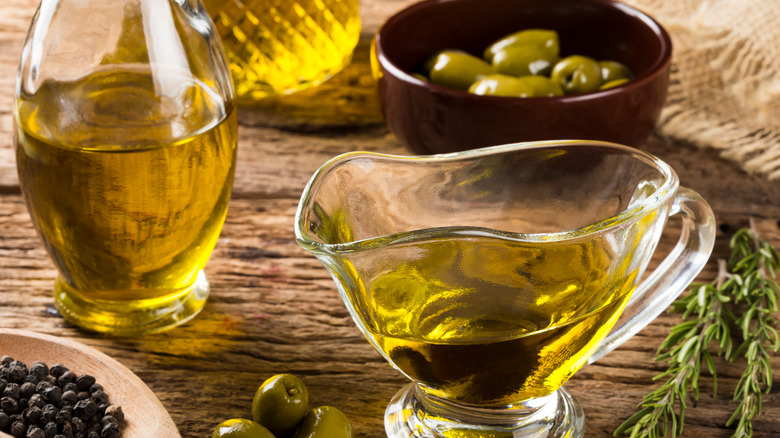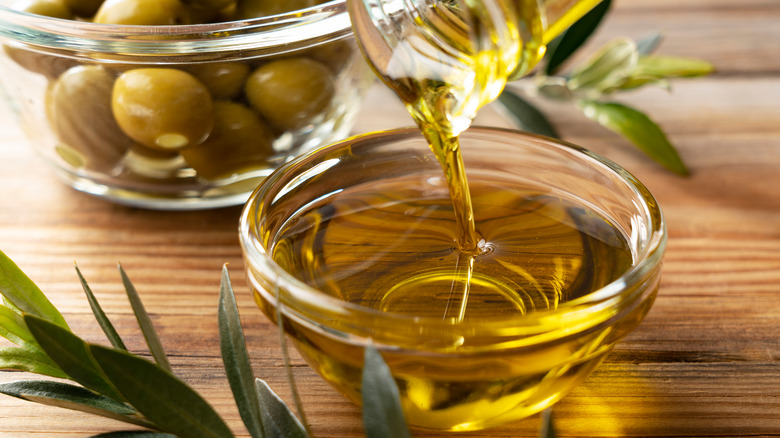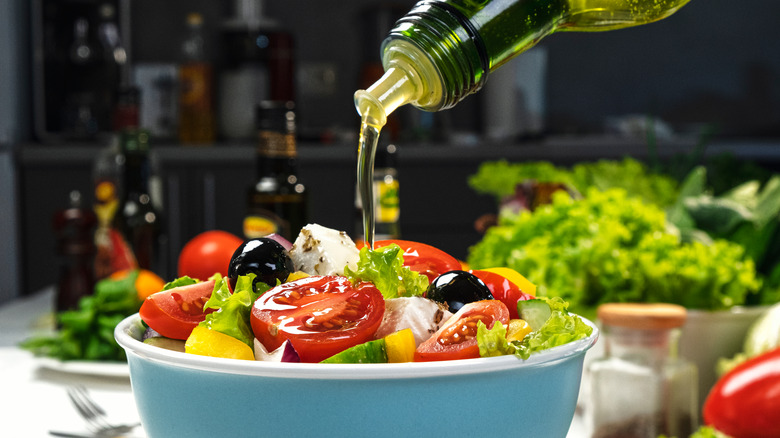Unrefined Olive Oil Vs. Refined: What's The Difference?
People seem to seek out extra virgin olive oil all the time, but what is extra virgin olive oil? How about refined olive oil? Is there a difference? Well, one thing to know right off the bat is that extra virgin olive oil is unrefined olive oil (via Caviar Star). The less virgin the olive oil, the more refined the olive oil is. Aside from the difference in flavor, there are a lot more chemical and nutritional differences between unrefined and refined olive oil than you might think, according to Healthline.
Refined and unrefined olive oil each has its own place in the kitchen, and there are certain instances where you should always use one over the other. For example, if you're cooking a nice steak, you should never use unrefined olive oil. On the other hand, you would most definitely prefer the unrefined olive oil in a salad dressing, due to its pure olive flavor, per Olive Oil. Let's take a look at why this is the case by seeing the real differences between unrefined and refined olive oils.
Extracting process
What you know to be extra virgin olive oil is essentially unrefined olive oil; it is the highest quality olive oil you can get since it is the least chemically and thermodynamically altered oil (via Caviar Star). You've probably seen that many extra virgin olive oil products state that the oil has been "cold-pressed." This means that there was no heat involved in the pressing process, so pure olives have been crushed into a paste and the oils have been extracted with mechanical force, notes Healthline. There are various grades of olive oil, and virgin olive oil lies somewhere in the middle of refined and unrefined olive oil. Most virgin olive oils are extracted without heat, but they are chemically altered for flavor, per Caviar Star.
Refined olive oil, or what we know to be regular olive oil or pure olive oil is extracted with the help of chemicals and heat. This means that much of the nutrients and natural flavors of this type of oil are diminished. Refined olive oil is said to be a lower-grade olive oil, and it tends to be clear and flavorless, like vegetable oil, says Caviar Star.
Taste and nutrition
As mentioned earlier, unrefined olive oil is the most unadulterated olive oil, which means it has a distinct olive flavor. Thanks to its noninvasive extracting process, extra virgin olive oil is more viscous and green in color. A lot of the nutritional benefits of olives are found in extra virgin olive oil, or unrefined olive oil–mainly, the 85% oleic oil content which is a healthy unsaturated fatty acid, as shown in this olive oil study. According to Healthline, this high level of oleic oil content makes extra virgin olive oil beneficial for heart health and cholesterol levels.
Lower grade olive oils that are more refined have a significantly lower oleic oil content percentage, with pure olive oil ranging from 3%-to-4% oleic acid, via Caviar Star. This means that much of the health benefits of extra virgin olive oil are lost, along with the earthy flavor of the olives.
Purpose
Although unrefined olive oil may seem much better to use in every instance, this isn't always the case. Refined olive oil is useful thanks to its neutral flavor and higher smoking point. Refined olive oil may lack the full health benefits of unrefined olive oil, but it is usually mixed with unrefined olive oil, and it is less chemically altered than vegetable oil and other seed oils (via Olive Oil Source). Refined olive oil is a great neutral oil to use for cooking, sautéing, or frying.
On the other hand, unrefined olive oil, in all of its flavorful glory, is a wonderful base for many salad dressings, sauces, or drizzles. Due to its low smoking point, it isn't the best oil to use for frying, but it acts as a great topping on a complete dish. Thanks to its fatty, thick viscosity, it becomes a wonderful binding agent for a variety of sauces. Extra virgin olive oil is also a fantastic addition to cakes, pasta, and even ice cream.
All in all, the two types of olive oil each have their own place in the kitchen. Due to their nutritional differences and differing smoking points, it's best to have both in your pantry — just make sure to keep your olive oils away from your stove.



